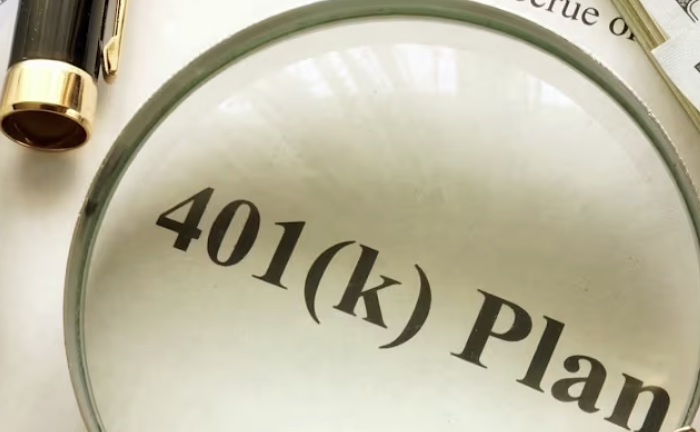
You spent decades climbing the career ladder, changing jobs, and building your nest egg. But there's a good chance that somewhere along the way, you left a piece of your retirement savings behind—and it could be worth a small fortune today.
Recent research reveals that $2.1 trillion sits in 31.9 million forgotten or left-behind 401(k) accounts across America.
That's not pocket change we're talking about—the average forgotten account holds $66,691, enough to make a real difference in your retirement years.
Even more striking: a full 25% of all 401(k) plan assets are now forgotten or left behind, up from 20% just two years ago.
If you've changed jobs even once in the past decade, you could be one of the millions of Americans with money waiting to be claimed.
Why this hits seniors hardest
If you're in your 60s or approaching retirement, this issue affects you more than younger workers.
The average 401(k) balance for people in their 60s is $573,624, but many accounts get left behind during decades of career moves.
The typical American worker now stays with an employer for just 3.9 years—the shortest tenure on record since 2002.
Over a 40-year career, that could mean 10 or more different employers, each potentially holding a piece of your retirement puzzle.
The financial impact compounds over time in ways that can devastate retirement security.
Consider this sobering example: A forgotten 401(k) with $66,600 sitting in a low-yield money market fund might grow to just $110,612 over 30 years, while that same amount properly invested could grow to $645,141—a loss of more than $500,000 in potential retirement income.
"A forgotten 401(k) could cost you over $500,000 in lost retirement growth"
Also read: Are You on Track for Retirement? See How Your 401(k) Stacks Up Against the Average for 65+ Retirees!
How retirement accounts go missing
The reasons are surprisingly common and understandable.
Companies merge, get acquired, or change their retirement plan providers.
You move, change your name, or update your contact information with some accounts but not others.
Sometimes employers automatically enrolled you in a 401(k) plan, and you weren't even fully aware you had an account.
Research shows that only 22% of people managed to roll over a 401(k) without professional help, and most who tried said the process took at least two months to complete.
Faced with paperwork, phone calls, and coordination between multiple financial institutions, many people simply put it off—indefinitely.
What happens to forgotten 401(k)s
When you leave money behind in a former employer's plan, several things can happen—and not all of them are good.
Small accounts (typically under $5,000) might be automatically cashed out, triggering taxes and penalties.
Others get moved to low-yield 'safe harbor' investments that barely keep pace with inflation.
Some plans charge extra fees for former employees, quietly eating away at your balance year after year.
Also read: $1.7 trillion in forgotten 401(k)s is just sitting there—could some of it be yours?
The treasure hunt begins: Your step-by-step search guide
The good news? Your money isn't truly lost—it's just waiting to be found. Here's how to track down those missing accounts, starting with the easiest options:
1. Start with the free databases
The Department of Labor launched its Retirement Savings Lost and Found Database in late 2024, specifically designed to help people locate workplace retirement benefits.
While still building its database, it's becoming the most comprehensive resource available.
Visit the National Registry of Unclaimed Retirement Benefits next. Simply enter your Social Security number and run a quick search.
It takes just minutes and could reveal accounts you'd forgotten existed.
Don't overlook Missing Money (MissingMoney.com), which searches unclaimed property databases across all 50 states and can turn up retirement accounts that have been transferred to state custody.
2. Dig deeper with employment records
Pull out those old tax documents and pay stubs. Look for any mention of retirement plan contributions or deductions.
W-2 forms from past employers often show 401(k) contributions in Box 12.
Contact human resources departments at former employers.
Even if the company has changed names or been acquired, someone in HR usually knows which retirement plan provider was used and can point you in the right direction.
3. Call the plan administrators directly
There aren't many major 401(k) administrators in the country.
Companies like Fidelity, Vanguard, Principal, and Empower handle millions of accounts.
A quick phone call to their 401(k) departments, armed with your Social Security number and employment dates, can reveal old accounts.
Did you know?
Did you know?
The average American born between 1957 and 1964 held nearly 13 different jobs between ages 18 and 58, according to Bureau of Labor Statistics data. That's potentially 13 different retirement accounts to track down—and explains why so many people lose track of their money.
What to do when you strike gold
Finding a forgotten account is just the beginning. You'll need to decide what to do with the money, and the choices you make can significantly impact your retirement security.
You have three main options: leave the money where it is, roll it over to your current 401(k), or move it to an Individual Retirement Account (IRA).
Each choice has pros and cons worth considering carefully.
Important considerations for seniors
If you're 73 or older, you'll need to start taking Required Minimum Distributions (RMDs) from all traditional 401(k) and IRA accounts.
Having multiple accounts makes this more complicated and increases the risk of missing a distribution—which triggers hefty IRS penalties.
Consolidating accounts into one or two places makes managing RMDs much easier and gives you better control over your overall investment strategy.
Also read: Why retirement savings feel harder than ever—and how Americans are adapting
Warning Signs: Protecting yourself from scams
Unfortunately, scammers know about the forgotten 401(k) problem and try to exploit it.
Be extremely wary of anyone who contacts you claiming to have found your 'lost' retirement money—especially if they ask for upfront fees or personal financial information.
Legitimate searches for retirement accounts are free through official government databases.
Never give out your Social Security number, bank account information, or other sensitive details to unsolicited callers or emailers claiming to help recover lost funds.
Always initiate contact yourself through official channels rather than responding to unsolicited outreach about found money.
Also read: Thinking of using your 401(k) to pay off credit card debt? Here’s what it could really cost you
Preventing future lost accounts
As you navigate any remaining career transitions, take steps to prevent creating new lost accounts.
Keep detailed records of all retirement accounts, including plan administrator contact information and account numbers.
Set up automatic forwarding for your email and update your address with all financial institutions whenever you move.
Consider consolidating accounts periodically rather than accumulating multiple small balances across different employers.
Don't let your money sit forgotten
- $2.1 trillion sits in forgotten 401(k) accounts nationwide
- The average forgotten account holds $66,691—enough to meaningfully impact retirement
- Start your search with free online databases like the DOL's Lost and Found tool
- Contact former employers and major plan administrators directly
- Consider consolidating accounts to simplify management and reduce fees
- Be wary of scammers—legitimate searches are always free
What This Means For You
Your forgotten 401(k) represents years of hard work and careful saving.
Every month that money sits idle in a subpar investment or fee-heavy account, it's not working as hard as it could for your retirement.
The search might take some time and patience, but discovering even one forgotten account could provide the financial cushion that makes your retirement significantly more comfortable.
The process has never been easier, with new government tools and databases specifically designed to reunite people with their retirement money. Don't let another month pass wondering if you're missing out on funds that rightfully belong to you.
Read next:
- 3 Things every retiree should check off before withdrawing retirement funds
- Getting ready for retirement: Tips to handle this major life shift
- How one scam drained a senior’s savings—and what you can do to stay safe
Have you ever discovered a forgotten retirement account from a past employer? What was that experience like, and what advice would you share with others conducting their own search? Share your story in the comments below.
Primary Source
https://www.usatoday.com/story/mone...-ira-retirement-savings-accounts/86463087007/
The True Cost of Forgotten 401(k) Accounts (2025) – Capitalize
Cited text: In conjunction with the CRR, we now estimate that the number of forgotten or left-behind 401(k) accounts has grown to 31.9 million as of July 2025, al...
Excerpt: Recent research reveals that $2.1 trillion sits in 31.9 million forgotten or left-behind 401(k) accounts
https://www.hicapitalize.com/resources/the-true-cost-of-forgotten-401ks/
25% of all retirement savings sit in forgotten 401(k)s. Is any of it yours?
Cited text: Forgotten 401(k) retirement accounts now hold a staggering $2.1 trillion across 31.9 million accounts, according to recent research by Capitalize and ...
Excerpt: Recent research reveals that $2.1 trillion sits in 31.9 million forgotten or left-behind 401(k) accounts
https://www.aol.com/finance/retirem...savings-sit-in-forgotten-401ks-134316084.html
25% of all retirement savings sit in forgotten 401(k)s. Is any of it yours?
Cited text: That
Excerpt: the average forgotten account holds $66,691
https://www.aol.com/finance/retirem...savings-sit-in-forgotten-401ks-134316084.html
'Forgotten' 401(k) account fees can cost workers thousands in lost retirement savings, report finds
Cited text: Now, 25% of all 401(k) plan assets are left behind or forgotten, according to the most recent data from Capitalize, up from 20% two years prior.
Excerpt: a full 25% of all 401(k) plan assets are now forgotten or left behind, up from 20% just two years ago
https://www.cnbc.com/2025/06/07/for...-workers-thousands-in-retirement-savings.html
The Average 401(k) Balance by Age
Cited text: So if you contribute the annual limit of $23,000 plus your catch-up contribution of $7,500, that’s a total of $30,500 tax-advantaged dollars you could...
Excerpt: The average 401(k) balance for people in their 60s is $573,624
https://www.tha.org/blog/the-average-401k-balance-by-age/
25% of all retirement savings sit in forgotten 401(k)s. Is any of it yours?
Cited text: The number of years workers stay with their current employer dropped to 3.9 years in 2024, the lowest level recorded since 2002, according to the Bure...
Excerpt: The typical American worker now stays with an employer for just 3.9 years
https://www.aol.com/finance/retirem...savings-sit-in-forgotten-401ks-134316084.html
25% of all retirement savings sit in forgotten 401(k)s. Is any of it yours?
Cited text: A forgotten 401(k) with $66,600 sitting in a money market fund charging 0.85% in fees might grow to just $110,612 over 30 years. That same amount in a...
Excerpt: A forgotten 401(k) with $66,600 sitting in a low-yield money market fund might grow to just $110,612 over 30 years, while that same amount properly invested could grow to $645,141—a loss of more than $500,000 in potential retirement…
https://www.aol.com/finance/retirem...savings-sit-in-forgotten-401ks-134316084.html
25% of all retirement savings sit in forgotten 401(k)s. Is any of it yours?
Cited text: Research from Capitalize found that only 22% of people managed to roll over a 401(k) without help.
Excerpt: Research shows that only 22% of people managed to roll over a 401(k) without professional help
https://www.aol.com/finance/retirem...savings-sit-in-forgotten-401ks-134316084.html
25% of all retirement savings sit in forgotten 401(k)s. Is any of it yours?
Cited text: Most people who tried said the process took at least two months to complete.
Excerpt: most who tried said the process took at least two months to complete
https://www.aol.com/finance/retirem...savings-sit-in-forgotten-401ks-134316084.html
How to Find Forgotten 401(k) Accounts
Cited text: Among its 90-plus provisions, SECURE 2.0 directed the U.S. Department of Labor (DOL) to establish a lost-and-found database for workplace retirement p...
Excerpt: The Department of Labor launched its Retirement Savings Lost and Found Database in late 2024
https://www.aarp.org/money/retirement/find-forgotten-401k-and-other-money/






